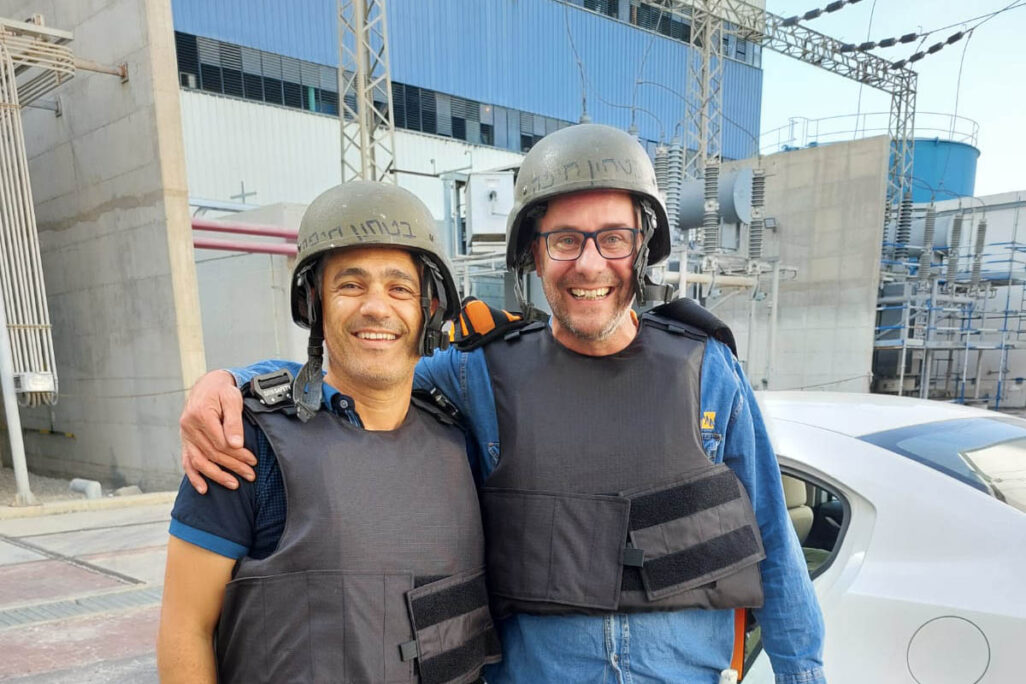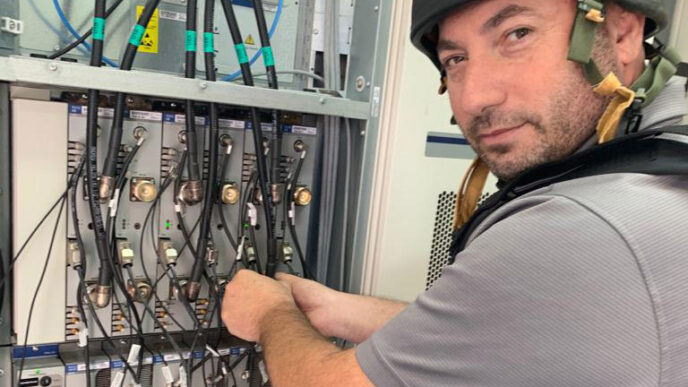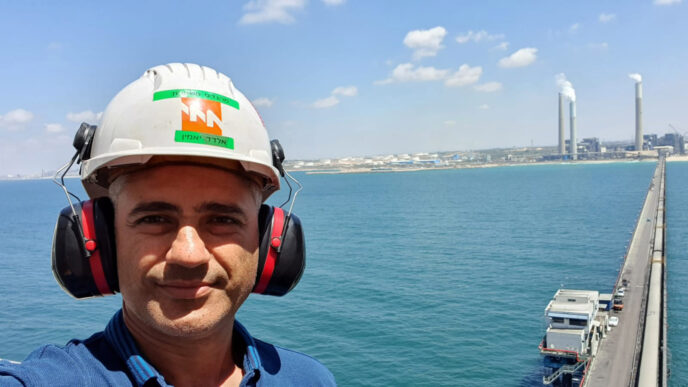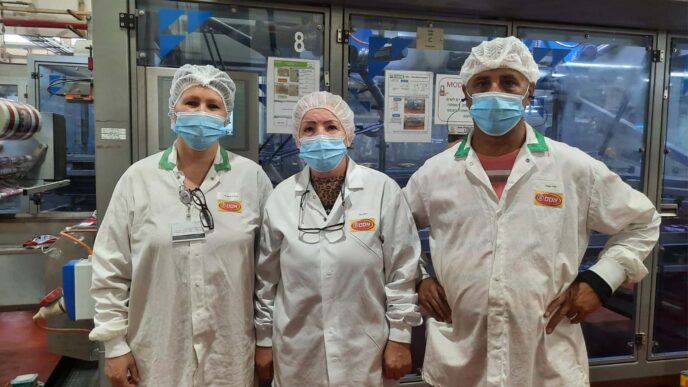
Even when the sirens blare for hours and days at a time, alerting Israelis of incoming rockets from the Gaza strip,, not everyone can stop everything. Essential workers in Israel’s southern towns face the unique challenge of balancing their safety during a military conflict, and maintaining the vital operations of the country’s myriad industries.
For Yigal Vetershvili from Pelephone, Eldad Yamin from the Israel Electric Corporation (both located in Ashkelon) and Miriam Elbaz from the Osem Nestle factory in Sderot, these dilemmas are familiar in times like this. They go to work, despite their family's fears, to allow for at least a sort of routine to prevail. Each of these workers spoke to Davar about their commitment to their work despite the escalating conflict.
Yigal Vetershvili, 46, Pelephone
“I have been an engineer at Pelephone since 1999. Our job is to maintain the network and make sure it runs smoothly. My team in Ashkelon is responsible for all cellular networks ranging from Nes Ziona to Kerem Shalom [a distance of 142 kilometers or 88 miles]. We need to maintain reception everywhere and address any problem that arises in terms of that.

"We control the cellular sites remotely, and what cannot be controlled or fixed remotely, we travel to the site to fix. We also receive inquiries from the service centers and customer service itself, and we resolve customer issues in real time.
“During escalations like this we are constantly connected to an app that alerts us of nearby sirens, and if we are in an area that is within range, we will wait for the situation to calm down before we start working. Pelephone provides us with personal protection when we are out in the field working: bullet-proof vests, helmets, armored vehicles, etc. If necessary, we are provided protection from the IDF (Israeli Defense Forces) or the company's security department.
"Every time we reach a site, we make an on-the-ground assessment and come up with a security protocol, should something arise. What happens if there is an emergency [rockets]? Where do we need to run to for cover? Where are the hiding places, etc. We sharpen our assessments and protocols so as to respond in the best and safest way.
“Our team is already accustomed to all the military operations and wars, and even during times of heavy rocket fire, we continue to provide service. I am married and have four children, and we live in Ashkelon. This is a difficult time and, obviously my wife is worried, but we are used to it. We understand that if there is a network malfunction, it is impossible to leave people without the ability to communicate, certainly on days like this. Beyond the sense of commitment to our society, this work in an emergency period also holds a deep sense of purpose.”
Eldad Yamin, 48, Israel Electric Corporation (IEC)
“I am an engineer at the Rutenberg Power Station in Ashkelon. I am responsible for the availability of electricity in the four production units at the station. I ensure that Israelis are able to receive continuous, available and reliable electricity and take care of troubleshooting.

“The other day, we went out to repair a damaged power line in the industrial area of Ashkelon. We worked during a rocket attack. The areas where we work on the power lines are unprotected [from rocket fire], so along with our standard safety work suits [made from plastic], we are given protective vests as well.
“When we are in areas where rockets are nearby, we take necessary actions to protect ourselves and find cover on the ground. There are workers who were stuck on a drivable lift during an attack, and they can only pray that everything will end well, because above them there are rockets and explosions. Employees show true dedication and sacrifice, because they know that electricity is an essential infrastructure, and it is impossible to stop work.
“I have two small children at home who did not leave the mamad [residential shelter] for three days. At night we were woken up every hour by sirens. The family knows I'm going to work and understands my situation, but it's definitely scary for them. One time I went to work a night shift during a severe attack that was in our area, and a woman from the city was killed. It was a sobering experience ‒ I drove on the road alone, in between all the sirens and explosions.
“When you go out into the field and there are rockets from Hamas and the Iron Dome whistling by above you – of course it is scary. But we know the importance of our job. In a way, we are going out to fight so that the residents and citizens of Israel will have electricity. We work 24/7 without asking questions. We do everything and beyond so that the electricity continues to power. It is an unparalleled dedication.”
Miriam Elbaz, 62, Osem Nestle
“I work in quality assurance at the Osem Nestle factory in Sderot. I sample products and send them for lab tests. Our factory ‒ by virtue of being a food factory ‒ is an essential factory. I feel our work is important, even when everything is calm, but most especially during times of heightened conflict. We make every effort to continue to work, to maintain the factory ‒ to continue to bring out excellent products to the citizens of the country, and to maintain the place that provides us with our livelihood. The employees here love the Osem factory and feel connected to it.

“The security situation has been with us for a long time, and unfortunately, we have almost gotten used to it. We do not complain much, our employees lack nothing. Sometimes, being at the factory feels even safer than being at home. There are safe rooms all over the factory: in the production facility, in the dining room, and in the yards.
“People from all over the Negev work here: from Sderot, Be’er Sheva, Kiryat Gat, Ashkelon and the surrounding communities. There are shuttles to and from the factory, and of course there is fear of traveling. But at the end of the day, we want to be there and work. We also have employees who come from [the predominantly Bedouin city of] Rahat who are like our family. We take care of each other at the factory, and create a good environment consisting of a sense of togetherness and mutual responsibility. The company's CEO, Avi Ben-Assayag, also visited the other day to support our employees and express his appreciation.
“This is a difficult time. The nights are hard, the children currently have no structure [school or after-school activities]. I also chair the union, so the workers treat me like a mother, and come to me with problems. Together with management and human resources we make an effort to address every request, help when it is needed and be as considerate as possible. We adjust the shifts so that women can come to work after their spouse returns from his work and can be with the children, and vice versa. The management has also provided mental health services and social workers for the employees and have committed to investing in employee welfare.”






